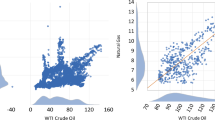Abstract
Energy security is placed at risk by exogenous supply shocks, in particular political crises and conflicts that disrupt resource extraction and transportation. In this paper, a computational model of the security of international crude oil supplies is described, and its output analyzed. The model consists of country agents, linked geographically and by a data-derived oil trade network. Countries stochastically experience crises, with probabilities and durations drawn randomly from data-fitted distributions. The effect of these crises on secure oil supplies is measured globally and by country, and the effect of conflict contagion and spare production capacity are also estimated. The model indicates that Russia, Eastern Europe, and much of the Global South are at the greatest risk of supply shocks, while American producers are at greatest risk of demand shocks. It estimates that conflict contagion decreases energy security slightly, while spare capacity has minimal effect.
Access this chapter
Tax calculation will be finalised at checkout
Purchases are for personal use only
Preview
Unable to display preview. Download preview PDF.
Similar content being viewed by others
References
International Energy Agency: Topic: Energy security (2013)
Yergin, D.: Ensuring energy security. Foreign Affairs 85(2), 69–82 (2006)
Wu, G., Liu, L.C., Wei, Y.M.: Comparison of china’s oil import risk: Results based on portfolio theory and a diversification index approach. Energy Policy 37(9), 3557–3565 (2009)
Jewell, J.: International Energy Agency: The IEA model of short-term energy security. Technical report, International Energy Agency (2011)
Stirling, A.: Multicriteria diversity analysis: A novel heuristic framework for appraising energy portfolios. Energy Policy 38(4), 1622–1634 (2010)
Skea, J.: Valuing diversity in energy supply. Energy Policy 38(7), 3608–3621 (2010)
Jacobson, M.Z.: Review of solutions to global warming, air pollution, and energy security. Energy & Environmental Science 2(2), 148–173 (2009)
Cederman, L.E.: Emergent Actors in World Politics. Princeton University Press (1997)
Geller, A.: The use of complexity-based models in international relations: a technical overview and discussion of prospects and challenges. Cambridge Review of International Affairs 24(1), 63–80 (2011)
Hamilton, J.D.: What is an oil shock? Journal of Econometrics 113(2), 363–398 (2003)
Kilian, L.: Exogenous oil supply shocks: How big are they and how much do they matter for the U.S. economy? Review of Economics and Statistics 90(2), 216–240 (2008)
United Nations Statistical Division: COMTRADE (2013)
United States Energy Information Administration: Countries (2013)
Natural Resources Canada: Energy sector demand and consumption (January 2009)
United States Energy Information Administration: How much of the oil produced in the United States is consumed in the United States? (March 2013)
Mohamedi, F.: Iran primer: The oil and gas industry. Technical report, United States Institute of Peace (December 2010)
Rasmi, A.: The risks of Saudi oil consumption. The Daily Star Newspaper - Lebanon (June 2013)
Mearns, E.: Oil watch - OPEC crude oil production (November 2012)
Daya, A.: Saudi Arabia can raise output 25% if needed, Naimi says (March 2012)
Economist Intelligence Unit: Social unrest. Technical report (2013)
Goldstone, J.A.: Political Instability Task Force: A global forecasting model of political instability. Political Instability Task Force (2005)
Cioffi-Revilla, C., Midlarsky, M.I.: Power laws, scaling, and fractals in the most lethal international and civil wars. In: Diehl, P.F. (ed.) The Scourge of War: New Extensions on an Old Problem (2004)
Themnr, L., Wallensteen, P.: Armed conflicts, 1946-2012. Journal of Peace Research 50(4), 509–521 (2013)
Hendrix, C.S., Salehyan, I.: Social conflict in Africa database (SCAD) (2013)
Author information
Authors and Affiliations
Editor information
Editors and Affiliations
Rights and permissions
Copyright information
© 2014 Springer International Publishing Switzerland
About this paper
Cite this paper
Masad, D. (2014). Simulating International Energy Security. In: Kennedy, W.G., Agarwal, N., Yang, S.J. (eds) Social Computing, Behavioral-Cultural Modeling and Prediction. SBP 2014. Lecture Notes in Computer Science, vol 8393. Springer, Cham. https://doi.org/10.1007/978-3-319-05579-4_37
Download citation
DOI: https://doi.org/10.1007/978-3-319-05579-4_37
Publisher Name: Springer, Cham
Print ISBN: 978-3-319-05578-7
Online ISBN: 978-3-319-05579-4
eBook Packages: Computer ScienceComputer Science (R0)




